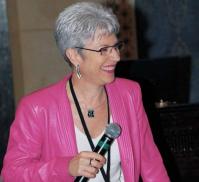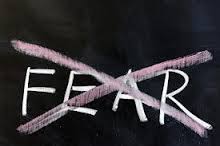5 Top Tips For Aspiring Women Speakers
 Susan notes: This article has been selected for DeFinis Communications' “Top Presentation Strategies for Women” Blog Carnival. See more posts from other exceptional bloggers on the same topic here.
Susan notes: This article has been selected for DeFinis Communications' “Top Presentation Strategies for Women” Blog Carnival. See more posts from other exceptional bloggers on the same topic here.
Are you a woman who wants to improve her prospects for success on a personal and/or professional level?
Are you a reluctant public speaker? Or even terrified of talking to more than one person at a time?
Do you become someone else when you start to speak to big groups, even though you are comfortable conversing with others one to one?
These three written tips (and the links within them), combined with two more tips in the video, can help you to feel more comfortable, confident and in control when you speak. (Please note: take the sweeping generalisations in the post for what they are: sweeping generalisations!)
1) Give Credit Where Credit is Due
At the most basic level, the biggest barrier women face when it comes to public speaking is believing they don’t have anything of interest to say! In my 15 years as a public speaking coach, I’ve met literally hundreds of women who devalue their expertise, their experiences and their unique stories. What a shame. What a waste.

Remember the old adage give credit where credit is due? It’s time to start with you. If you think you don’t have much of interest to say, think again. No wait. Don’t think, take action. Ask friends, family, peers, bosses, employees, suppliers, your book club members – even your kids – what THEY think you’re good at. What would they like you to share with them? What would they like to learn from you? Ask them to write their answers. You may be surprised at the results.
2) Leave Your Fear Behind
Fear of public speaking has no gender boundaries. But women often feed their fear more than men. In fact, many women can scarcely imagine anything worse than being in front of a group and having “all eyes” on them.
 I think the being-in-the-spotlight aversion is partly due to the way we’re socialized. We’re taught that it’s not ladylike to be the center of attention, that instead we should be demure, deferential and self-deprecating (more about my views on gender parity and women on world stages here). It’s tough to overcome those deeply ingrained beliefs and take center stage. But it can be done. And the payoffs are huge!
I think the being-in-the-spotlight aversion is partly due to the way we’re socialized. We’re taught that it’s not ladylike to be the center of attention, that instead we should be demure, deferential and self-deprecating (more about my views on gender parity and women on world stages here). It’s tough to overcome those deeply ingrained beliefs and take center stage. But it can be done. And the payoffs are huge!
The majority of women are supportive and caring, perhaps by nature, but also because we are socialized to be so, just like we are socialized to be humble. But in this case, socialisation can be a help rather than a hindrance. Here’s how: stop thinking about yourself and how afraid you are, and start focusing on the audience, and how helpful you can be to them.
The information you have to share with others might change their lives for the better in some way. You have a responsibility to make your voice heard, and thus to potentially make the world a better place. (See more tips on getting over fear of public speaking here.)
3) Start Having Conversations
Practice is the foundation of being a great presenter (it “makes perfect” as they say), that’s why my workshops are 85% practice and only 15% theory. One of the things I noticed early on in my public speaking coaching career is that as soon as people are told it’s time to start delivering their presentation or speech in a rehearsal or role play, they stop being themselves and switch into what I call “presentation mode.”
Presentation mode is robotic, artificial, stiff, and unnatural. And worse, it makes people feel more anxious than they already are. In a matter of seconds potentially great presenters become like proverbial “deer in the headlights:” frozen! And it’s all because of the word “presentation,” and what it evokes for them.
 One solution? Delete the word “presentation” from your vocabulary – and from your mind. Imagine: you will never have to give another presentation in your life! Woo hoo! Instead you will have interesting, engaging, dynamic conversations with groups of people (sometimes few in number, sometimes more), about fascinating, useful, relevant-to-them material that could potentially change them, their family, their business, their community, their country, maybe even THE WORLD.
One solution? Delete the word “presentation” from your vocabulary – and from your mind. Imagine: you will never have to give another presentation in your life! Woo hoo! Instead you will have interesting, engaging, dynamic conversations with groups of people (sometimes few in number, sometimes more), about fascinating, useful, relevant-to-them material that could potentially change them, their family, their business, their community, their country, maybe even THE WORLD.
Doesn’t that sound like a lot more fun than “making a presentation”? Women are, overall, great communicators, so let’s do what we do best and COMMUNICATE!
Find two more quick tips (the one about putting the audience first is repeated) in this one-minute video: